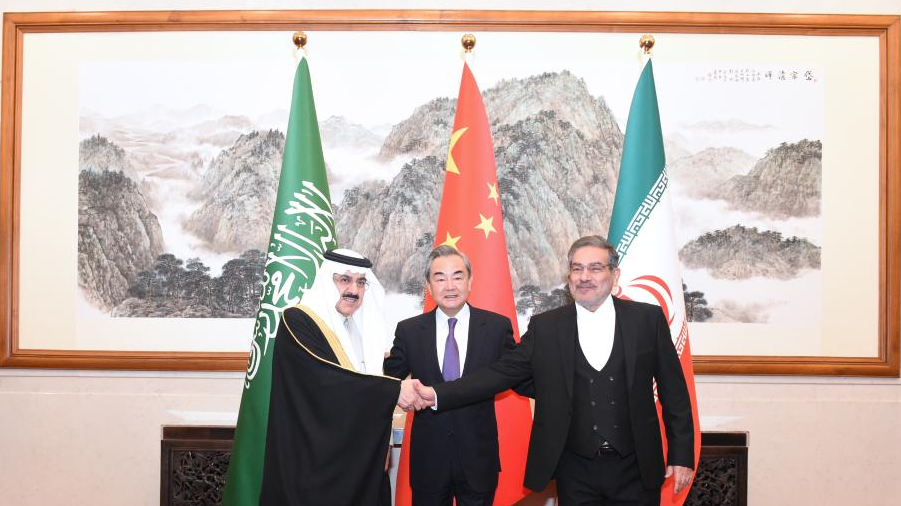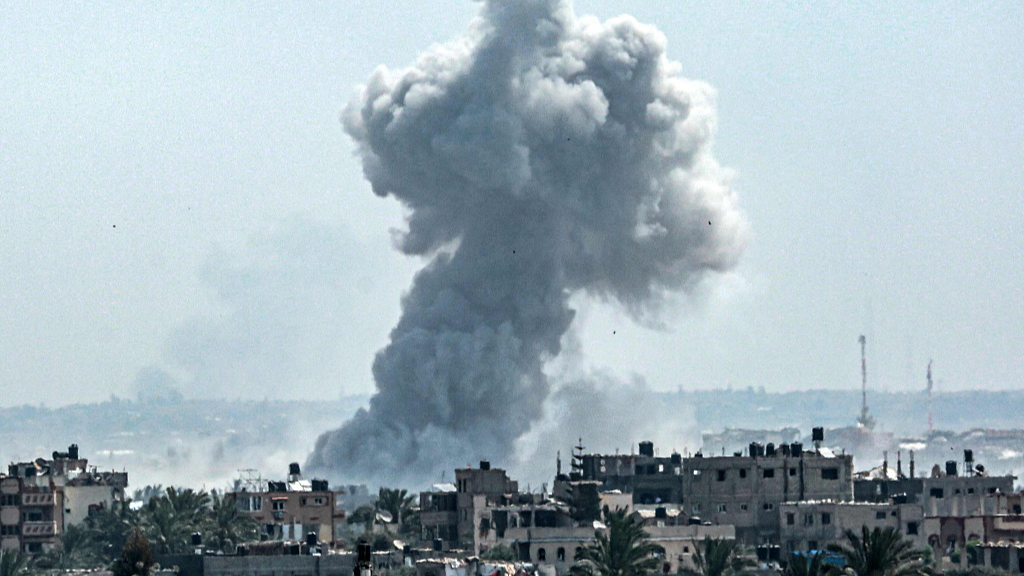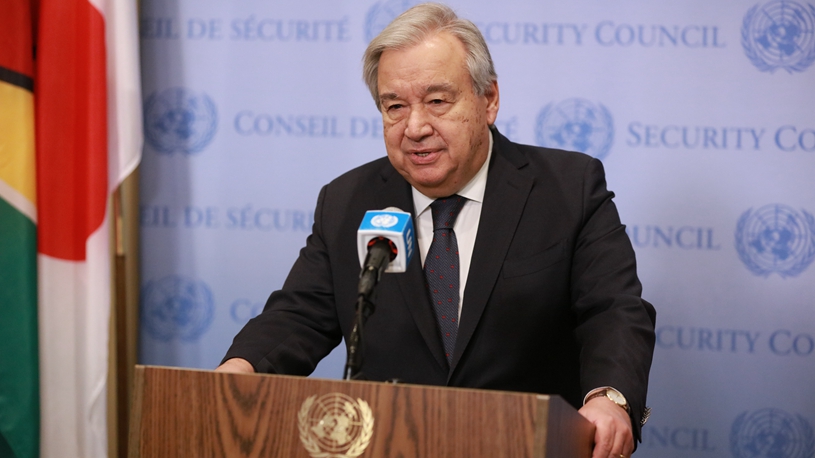Sunday marks the one-year anniversary of the reconciliation between Saudi Arabia and Iran through China’s mediation.
Over the past year, the Saudi-Iranian relationship has weathered regional turbulence and yielded concrete peace dividends for their people and the region.
The historic reconciliation not only epitomizes China’s dedication to regional peace but also sets a new paradigm for resolving conflicts through dialogue and negotiation.
Today, China’s advocacy for peace still resonates with Middle East countries.
As the protracted Israel-Hamas conflict looms large over the Middle East stability, countries in the region are yearning for more peacemaking efforts to help restore tranquility.
‘A new formula for security and peace’
The conflict between Saudi Arabia and Iran was one of the major sources of tension in the Middle East.
The two countries were at loggerheads over a myriad of issues, engaging in proxy military conflicts by backing opposing forces in countries like Yemen and Syria.
In 2016, Saudi Arabia cut diplomatic ties with Iran in response to the attacks on Saudi diplomatic missions in Iran after the Kingdom executed a Shiite cleric.
To help the two countries achieve detente, China assumed the role of a mediator, leveraging its amicable relations with them to facilitate communication and dialogue between the feuding parties.
On March 10, 2023, in a joint statement released with China in Beijing, Saudi Arabia and Iran announced that they had reached an agreement to reopen their embassies and diplomatic missions within two months, marking a milestone in the thawing of their relations.
China’s facilitation of the Saudi-Iranian reconciliation has acted as a catalyst for a new dawn of detente among Middle Eastern nations.
Shortly thereafter, a string of positive advancements unfolded in the Middle East peace process: Syria returned to the Arab League after a hiatus of 12 years; Qatar and Bahrain decided to restore diplomatic ties; relations among Iran, Turkey and Egypt improved; and tensions subsided in Yemen.
“This is a victory for dialogue and peace,” said Wang Yi, director of the Office of the Foreign Affairs Commission of the Communist Party of China Central Committee, when assessing the historic reconciliation.
“The Chinese-brokered deal for restoring the Iranian-Saudi relations presents the Middle East with a new formula for seeking security and stability,” said Noha Bakir, a professor of political science with American University in Cairo.
‘There is far more depth’ to the detente
Over the past year, building on the conciliation, Saudi Arabia and Iran have been making breakthroughs in exchanges in various domains, including politics and economy.
On April 6, 2023, Saudi Foreign Minister Faisal bin Farhan Al Saud and his Iranian counterpart, Hossein Amir-Abdollahian, signed a joint declaration in Beijing, announcing an immediate resumption of diplomatic relations.
Just days after the recommencement of ties, Farzad Piltan, West Asia director at Iran’s Trade Promotion Organization, announced that in the short term, the restoration of political and diplomatic ties would enable the two countries to achieve $1 billion in trade, with potential for further expansion to $2 billion in the medium term.
In September 2023, the new Iranian ambassador to Saudi Arabia, Alireza Enayati, arrived in Riyadh. On the same day, the Kingdom’s new envoy to Iran, Abdullah bin Saud al-Anzi, began his diplomatic duties in Tehran.
In October, Iranian President Ebrahim Raisi held his first-ever phone call with Saudi Crown Prince and Prime Minister Mohammed bin Salman Al Saud, aligning their positions on the newly ignited Israel-Hamas conflict.
One month later, upon Saudi Arabia’s invitation, Raisi arrived in Riyadh to participate in a joint Arab-Islamic summit on the Palestinian issue, and held a meeting with the crown prince of Saudi Arabia.
The close interactions between Saudi Arabia and Iran over the past year indicate that “there is far more depth” to the detente “than some analysts might have expected a year ago,” Giorgio Cafiero, the chief executive officer of Gulf State Analytics, a Washington, D.C.-based geopolitical risk consultancy, opined in a recent article.
With their burgeoning relationship, the two countries are sending a clear message to the outside world: resilient peace can only be achieved through a reconciliation anchored in sincere dialogue.
China’s dedication to peace still resonates
At present, the fallout from the Israel-Hamas conflict and certain countries’ obstruction of ceasefire efforts are posing a grave threat to the longstanding peace endeavors in the Middle East.
Against such a backdrop, China’s advocacy for resolving conflicts through dialogue and diplomacy holds even greater importance for nurturing peace in the still war-torn land.
“Following Beijing’s contribution to the reconciliation between Tehran and Riyadh, there has been a perception in the region that China seeks to … create a regional situation where cooperation can outweigh and replace confrontation,” said Abas Aslani, an expert on Iran’s foreign policy based in Tehran.
China’s dedication to the Saudi-Iranian reconciliation and its success stand in stark contrast to Western intervention in Middle Eastern affairs, which has yielded little progress in advancing the peace process, said Bakir, the Cairo-based professor.
“The Arab world has been fed up with the Western ‘conditional relations’ … In such a context, it is sensible for the Arab countries who trust China as a sincere partner to adopt the Chinese diplomacy … as an appealing model,” she added.
China’s approach to achieving security resonates with the Middle East nations’ aspirations for peaceful development, said Abdulaziz Alshaabani, a Saudi researcher at Al Riyadh Center for Political & Strategic Studies, adding that the Saudi-Iranian reconciliation has solidified the concept of peace and development as a shared consensus across the region.
“The resolution of the Saudi-Iranian rift serves as a testament to the efficacy of China’s diplomatic endeavors in fostering regional peace,” said Hamed Vafaei, a sinologist at the University of Tehran. “A more peaceful Middle East and world at large requires the participation of more peace contributors like China.”
Source(s): CGTN

 News6 days ago
News6 days ago
 Sports6 days ago
Sports6 days ago
 News6 days ago
News6 days ago
 World5 days ago
World5 days ago
 Sports6 days ago
Sports6 days ago
 News5 days ago
News5 days ago
 News6 days ago
News6 days ago
 News5 days ago
News5 days ago


















